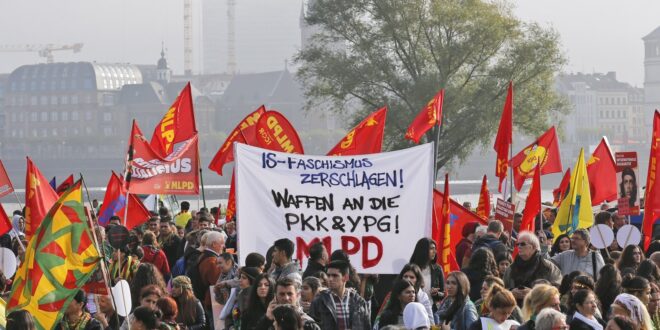The top German intelligence chief said the PKK is the biggest foreign terrorist group in the country, with around 14,500 supporters.
Türkiye has complained that despite the group’s illegal status, European Union countries have long turned a blind eye to its activities on their soil, including media outlets, pro-terror demonstrations, and violence threatening Turkish diplomatic offices and Turkish nationals abroad.
“Extremists use crises to make connections with the middle classes and also share conspiracy myths, disinformation, and propaganda,” said Thomas Haldenwang, the head of Germany’s domestic intelligence agency Federal Office for the Protection of the Constitution (BfV) during a joint news conference with Interior Minister Nancy Faeser in Berlin.
Right-wing extremism continues to be the greatest extremist threat in the country, he remarked.
“We also see a high level of radicalization in violent left-wing extremism,” Haldenwang added.
According to him, the threat of espionage, illegitimate influence, disinformation campaigns, and cyber-attacks has also risen, largely also due to Russia’s war on Ukraine.
“The main actors in these activities directed against Germany are the Russian Federation, the People’s Republic of China and the Islamic Republic of Iran, each with a different focus.”
Faeser echoed his remarks, saying: “The criminal war of aggression against Ukraine has changed the security situation throughout Europe. We have taken strong measures to arm ourselves against espionage, disinformation campaigns and cyber-attacks.”
“The intelligence report shows that extremists are becoming more violent and younger and that ideologies are becoming increasingly mixed,” she said.
A member of the PKK terrorist group eliminated in a Turkish Armed Forces (TSK) operation in northern Iraq last week was revealed to be a German citizen, the Turkish Defense Ministry announced Tuesday.
Thomas J., codenamed “Azed Sergeş,” was among a group of terrorists killed in a drone strike in the Iraqi region of Hakurk on June 15 as part of Türkiye’s cross-border operations targeting the likes of PKK and Daesh, the ministry informed.
Thomas J. was born in Mainburg, a city in the state of Bavaria, and joined PKK ranks in Munich.
Security experts described the situation as “the biggest proof that PKK recruitments at home have dwindled to almost extinction.”
Several reports from Turkish and international law enforcement agencies have also shown the group can finance its bloody terrorist campaign through drug trafficking in the European Union, raking in over $1.5 billion annually. It relies on its supporters and pro-PKK political groups across Europe.
Although Türkiye has repeatedly called on its NATO ally Germany to take stronger action against the PKK, the terrorist group’s activities have been largely tolerated by authorities, and Berlin has been reluctant to do more to combat the group.
Türkiye has frequently voiced concerns over European countries’ tolerance toward the PKK, however, the terrorist organization still maintains a strong presence in the region, being able to hold rallies and engage in recruitment activities.
As recently as last month, sympathizers of the group attacked a mosque in the northwestern city of Bad Bentheim, which the German police said would handle as not a case of “damage to the property via graffiti.”
 Eurasia Press & News
Eurasia Press & News




